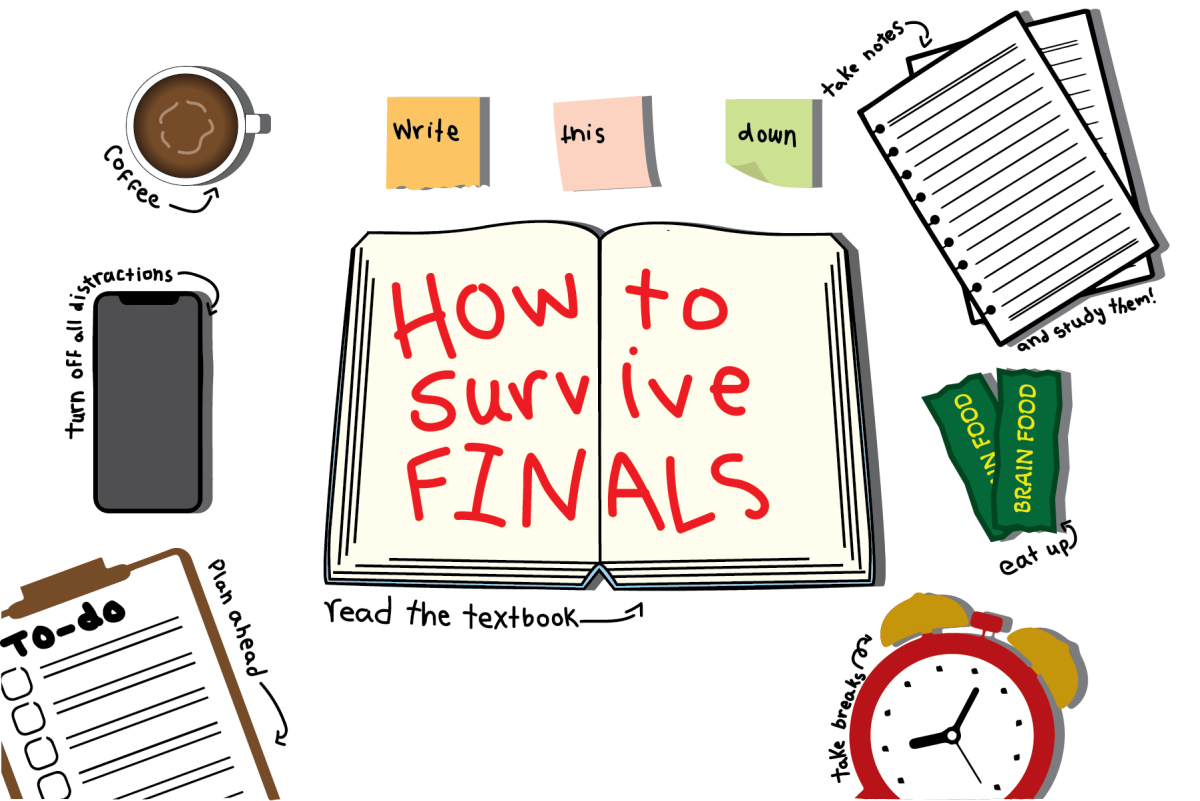After hours and hours of time spent religiously attending classes, studying at ungodly times of day and scraping the very last inklings of motivation out of the depths of one’s soul, the effort of a few months comes down to just one single week: exam week.
The stress piling up into finals week can reach colossal levels. With the assault of final projects and papers, the symptoms of burnout ever mounting, the final examination period transforms what otherwise would be routine exam crams into a seemingly unending uphill climb.
It may be an absurd ask to college students that they put on the line, in just the space of a few exam periods, all of the time and energy they have poured into the semester. Many have argued the age-old system of final examinations is archaic and a poor measure of the worth of a student’s toils. Yet, this is simply how it is, and it’s the price each student must pay to persist with their education.
Finals week is never not going to suck. However, it doesn’t always have to be a frantic scramble to the finish line. With the right amount of diligence and belief, students can turn their week in the devil’s lair into an empowering goodbye to the classes of the semester past.
There are a lot of ways to stay steady through the passage into the end of the semester. There are also surefire ways to sabotage your sanity during this time, perhaps the most familiar being procrastination.
For all the serial procrastinators out there, here’s some good news: there’s a way to not do your work, and still feel good about it.
Often, just starting an assignment can be the hardest point. Looking beyond this benchmark is where it is easiest to get stuck. Setting a really low bar for school work sessions can curb habits of procrastination.
Instead of focusing on knocking out significant chunks of whatever set of final study notes or semester projects, try first to get started. If it’s a final paper or project, read over the parameters and format the document or scribble down a few ideas – even the bad ones. Visit professors’ office hours to clarify any points of confusion.
Little acts to get the ball rolling can be a really powerful way to avoid purchasing a one way ticket on the struggle bus to deadline doom.
Planning a time to work on something is always a good idea. Expecting school obligations to get done during random swaths of freetime is dangerous thinking.
Preparing ahead and putting a set time on that first effort towards the items on one’s academic to-do list does wonders. The optimistic expectancy that things will get done on their own time can be swapped for the assurance of intentional plans.
When it comes to dissipating the dark cloud of the final project that hangs over the second half of the semester, planning just 15-30 minutes somewhere in the month or weeks leading up to finals proves revolutionary. Put the getting-started part out of the way sooner rather than later.
While the final deadline push is sometimes unavoidable for even the most prepared, lightening the load before the last hours is worth the effort. Planning ahead with deadlines in mind is necessary, but don’t get two steps ahead of the process. Once the plan starts to exceed the next feasible action, those procrastinative tendencies can start to flare up again.
Write down this magic recipe for preparedness on a sticky note somewhere in plain sight: Plan ahead, keep the first bar low and clear one hurdle at a time.
On the contrary, for some, long hours in some forgotten crevice of the library are inevitable affairs. Even with careful planning and legitimately productive hours of focus, the final deadline long haul is unavoidable. Making the most of these final deadline hours is essential as quality increasingly drops and the last cram attempts are desperately wagered.
To make the most of those last ditch end-of-semester grinds, take it seriously, but most importantly, make it fun.
Listen to your favorite study tunes and munch on tasty snacks known to enhance focus such as berries, dark chocolate or citrus fruits. Invite that one friend who is always a great chat but who also actually knows how to quiet themselves and study for more than five minutes at a time. Follow the 52-minute focus, 17-minute break golden ratio discovered by the productivity app DeskTime.
Taking periodic walks to get in a breath of fresh air or to wander the hallways of one’s study building of choice is a great way to refresh the mind. Studying and school work doesn’t all have to be what it sounds. In fact, people who know how to time their breaks are more productive. Taking little breaks not only improves productivity, but also reduces stress and signs of burnout.
Also, make sure to celebrate each victory. Got the first exam out of the way? Get a pastry with tomorrow’s coffee. It’s probably not wise to go out the night before a morning final, but avoid being all work and no play. Rewarding oneself is equally as important as working hard.
It can be easy to forget it, but humans have needs that aren’t academic. Attempting to get everything done without socializing, moving or enjoying oneself is not a realistic strategy for escaping the semester unscathed. Work time into the day for things that have nothing to do with school.
Finally, let the excitement of the impending break motivate yourself. Don’t forget to look at the light at the end of the tunnel. All that has been done up to the semester’s climax should not be in vain. All it takes is one last push and bam — break will arrive.
After all the dust has settled, shift that serious motivated attitude onto break. Now, be serious about having fun and doing the things you love.







